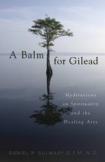Faith-ful Health Care
To read A Balm for Gilead is to want author/friar/physician Daniel Sulmasy and his disciples to be your doctor, nurse or therapist. A practitioner with a deep sense of spirituality who considers healing an encounter with the divine will not blame us for our bad habits, will not be repulsed by what illness does to our bodies, will not give up on us when treatments do not work and will see in us the opportunity to serve God.
Sulmasy takes his title from the spiritual sung in his Harlem parish:
There is a balm in Gilead
To make the wounded whole.
There is a balm in Gilead
To heal the sin-sick soul.
In this case the wounded, sin-sick soul does not belong to patients but to physicians and other health practitioners who are in need of wholeness and healing. The book explores the relationship between healing and spirituality, diagnoses the problem of a broken spirit and prescribes a course of spiritual treatment. In the process, the author brings us readings from Scripture and literature, poetry and prayers. He relays the hopeful message that God’s love and grace can bring needed healing.
Sulmasy says that as a group, physicians and their colleagues seem to have lost their way. Despite medical advances within the past 50 years, health care workers are among the most dissatisfied of all professionals in America today. Part of the problem is the success of medical science itself. We physicians have become too taken up with our own success...and have begun to harbor the belief that there is no health care problem that science can’t solve. Patients, too, erroneously believe that all can be cured.
But technology has begun to bite back, he tells us. Cures are causing new illnesses. Patients often feel depersonalized or imprisoned by the technology that was supposed to free them. Practitioners may feel more like mechanics than healers.
The financing of health care raises another set of problems. Self-interest is on the rise with competition for health care dollars, and physicians, once held in the highest esteem, stand accused of having spent other people’s money wantonly for decades. Worse still for the spirit, the system invites lies to insurance companies to get needed coverage.
Many physicians today are in a state similar to that of the Prodigal Son. Lost. Buried in mounds of paper. Hurt, because their patients no longer trust them. Dissatisfied, because their practices have become so depersonalized. Bewildered, wondering how it all could have happened.
Sulmasy uses the Gospels and a deep understanding of the relationship between healing and spirituality to suggest a course of treatment: recover the sense that each encounter with a patient is an encounter with God and treat all patients with reverent attentiveness; be humble, remember that one’s talent and the power to heal come from God; and recommit to health care as a service, showing love for patients because every one was created in the image of God.
The Gospel, he believes, can inspire health care professionals. The story of the man born blind (John 9:141) suggests we ask ourselves if we have been blind to the needs of the poordeaf to the cries of patients in painand mute in the face of growing immorality of our professions. The healing miracles remind us that healing is ultimately the restoration of right relationships, including the relationships with patients.
The Beatitudes (Matt 5:1-12), too, have lessons for health care professionals who may feel like the downtrodden Jews for whom they were written.
Blessed are the poor in spirit and Blessed are those who mourn teach that in the face of loss of income, prestige, power and autonomy, God is still present.
Blessed are the meek reminds health professionals to be respectful and compassionate, not taking out frustration on patients or others.
Blessed are those who hunger tells practitioners to fight against injustice in the health care system.
Blessed are the merciful urges physicians and others to forgive themselves, their patients, their government, and even insurers.
Blessed are the pure of heart and Blessed are the peacemakers remind us that the best way to cleanse the human heart of impurities such as pride, greed and cynicism and to find peace in the chaos of the health care system is through prayer and grace.
Finally, Blessed are the persecuted... admonishes today’s practitioners that their professions have weathered worse before. They are harassed only by bureaucrats, and no one is feeding doctors and nurses to lions.
A Balm for Gilead is a pleasure to read, because it inspires and reaffirms that faith can properly be incorporated into medical and health care practice. Friar Sulmasy tells us that the Franciscan way is to show, not say, and this book is at its best when he presents stories from his medical practice. He is a natural storyteller, and I wished for more. But he is also a gifted poet and writes wonderful prayers. The following, for example, is excerpted from a residency graduation prayer:
We ask your grace that we may never consider our
Intelligence to be sufficient without fervor;
Knowledge without awe;
Counseling without respect;
Examination without reverence;
Diagnosis without meaning;
Prognosis without hope;
Therapy without compassion.
What more could we want from those who take care of us?
This article also appeared in print, under the headline “Faith-ful Health Care,” in the November 6, 2006, issue.








